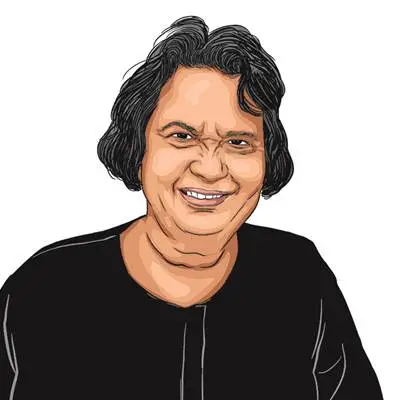Opinion Hugh and Colleen Gantzer write: Women’s Bill, through our travels
We learnt that women's empowerment is inevitable, and won't be denied
 The mother is, therefore, the cement of all human society. This basic fact is recognised by the four ancient Indic religions: Hinduism, Jainism, Buddhism, Bon and their various clones. Significantly, the word for power is also the word for femininity — shakti. (Representational Image)
The mother is, therefore, the cement of all human society. This basic fact is recognised by the four ancient Indic religions: Hinduism, Jainism, Buddhism, Bon and their various clones. Significantly, the word for power is also the word for femininity — shakti. (Representational Image) We knew it would happen.
Before we became travel writers, one of us had been the Judge Advocate of the Southern Naval Command. We brought that legal discipline into our travel writing. When we travelled, we recorded our first impression as they do in courts in the examination-in-chief. When we got home we researched those impressions as the defence does in the cross-examination and in the examination of its expert witnesses. We then analysed all this before we arrived at a conclusion.
This system led us to believe that though societies accept the fundamental role women play in birth, childbearing, home building and problem sharing with other women, which is the basis of civilisation, men have consistently refused to acknowledge this, insisting on the importance of their muscle power. But as society evolves from muscle power to mechanical power to automation and the beginning of artificial intelligence, the predominant role of men diminished. It is significant that in Scandinavian societies, which provide the most cradle-to-grave protection for their citizens, women play a significant role in civic affairs. This was brought home to us when we toured Finland.
In our five decades of travelling around many nations and visiting every state and Union Territory in our land, we have used the same method of recording, researching and analysing. You don’t need to have a doctorate in Social Psychology or Political Science when you can access papers written by experts. Such research has led us in many fascinating directions. Thanks to this system, we got an insight into the might of feminine power when we started our careers in Kerala. There, the martial community of Nairs had invented the ancestor of all Asian martial arts — Kalarippayat. In Nair society, inheritance is through the maternal line and their logic for this is very simple: The fact that you are born from your mother. This is a matter of evidence. But who was responsible for fertilising the egg that became you, is a matter of faith.
The mother is, therefore, the cement of all human society. This basic fact is recognised by the four ancient Indic religions: Hinduism, Jainism, Buddhism, Bon and their various clones. Significantly, the word for power is also the word for femininity — shakti.
The mystery of conception and birth has always surrounded women with a certain magical aura. One of the most ancient religious idols 25,000 to 30,000 years old is the Venus of Willendorf. It depicts a female figure with her feminine characteristics exaggerated. Such features show the special reverence that primitive humans felt for the female. Males had the muscle, women had the means to add to human society. This gave women a special authority over their tribes. The island of Minicoy in Lakshadweep has a largely Muslim population. And yet unlike the hyper male society of the Taliban, it has a special civic body composed entirely of women. Similarly, when we toured the Muslim nation of Turkey, our guide was a young woman who smoked and mixed freely with her male colleagues. Turkish society follows the Islamic faith but prides itself on the equality of its sexes.
When we were in Manipur, on a commission from the Union Ministry of Tourism, we learnt that one of the traditions of that state was its unique Women’s Market, which reportedly started in the 16th century. It hosts 5,000 to 6,000 women vendors who have to be either married or divorced. They sell a variety of products ranging from food items to handicrafts. Vendors have the right to pass on their membership of the market to any eligible members of their family. A single generation in a family is generally taken as 25 years, or four times in a century. This would mean that families have been associated with each other in the market for 20 generations. Is it likely then, that relationships with fellow vendors established over 20 generations could be broken as easily as they were during the brutal attack by the males of one ethnic and sectarian group on the females of another?
We have seen such inhuman acts of depravity occurring during the Partition of our land but when people are uprooted from their beloved homes, emotions can run high. What deep dark emotions were generated in Manipur to cause the horrors that a certain section of women were subjected to? If 20 generations of Manipuri women have traded together in the unique Women’s Market, who or what caused this sudden, and vicious curdling of generations of sisterhood? We have no answers and no one has provided any.
Surprisingly, this very hurtful issue has not featured prominently in our civic debate. The rape of a woman in Delhi rocked the nation. The public humiliation of rape and reported death of many women in Manipur have not caused the national outrage that they should have. How, and why has this happened?
When the power of the female vote improves in Parliament, we shall hopefully get a clear answer to this deeply troubling question.
Hugh and Colleen Gantzer are travel writers





